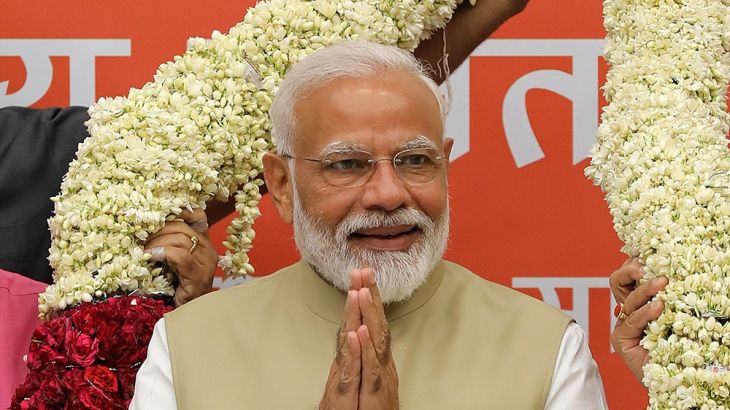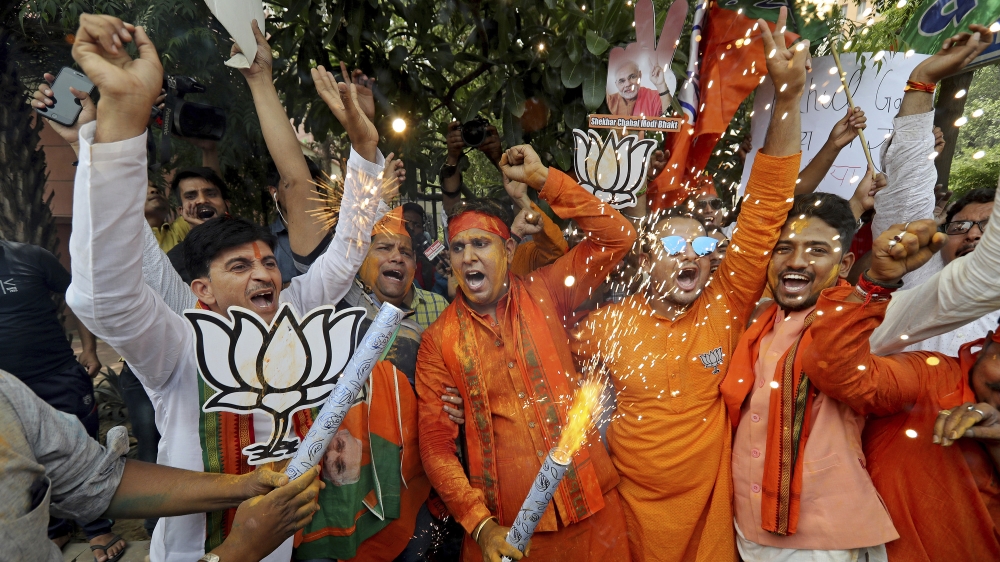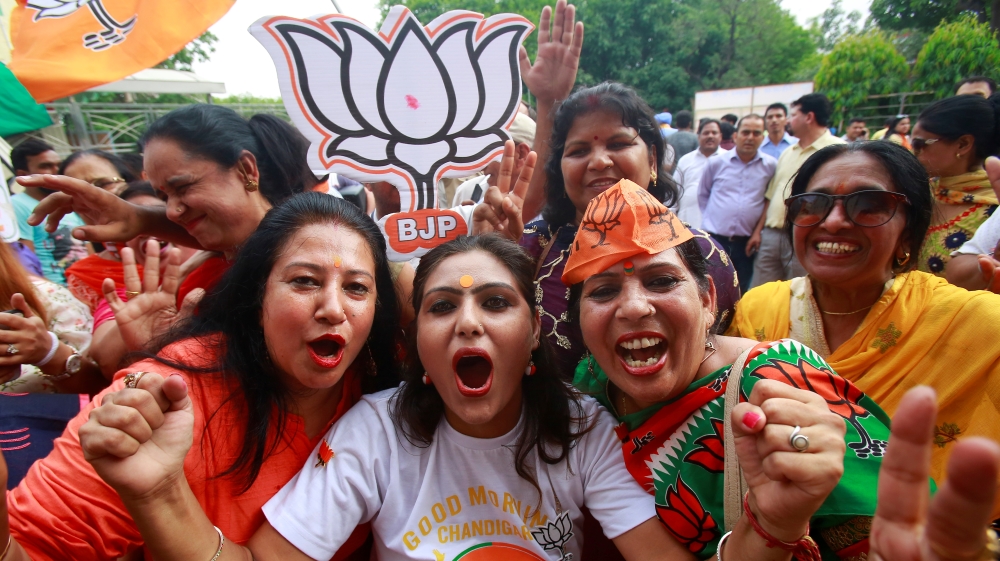India votes Modi back with landmark mandate
Hindu nationalist BJP storms back to power with thumping majority, winning more than 302 of the 543 parliamentary seats.

New Delhi, India – Prime Minister Narendra Modi‘s Hindu nationalist Bharatiya Janata Party (BJP) has returned to power registering a landslide victory in the Indian elections.
The BJP, which ran a presidential-style campaign with Modi as its mascot and based its campaign on a hardline Hindu agenda, won 302 seats and was leading on one seat out of the 542 seats up for grabs on Thursday.
Keep reading
list of 4 itemsFull jury panel seated on third day of Trump’s New York hush-money trial
Jacob Zuma’s nine lives: How South Africa’s ex-president keeps coming back
A flash flood and a quiet sale highlight India’s Sikkim’s hydro problems
The party has improved its performance compared with the 2014 elections when it won 282 seats.
“It is not Modi’s victory, but a win of people’s hope and aspirations,” Modi said, addressing supporters at party headquarters in New Delhi.
“Whatever happened in these elections is in the past, we have to look ahead. We have to take everyone forward, including our staunchest opponents.”
The return of the right-wing party to power with a bigger mandate has caused concern among the country’s Muslim community, which suffered attacks by Hindu vigilante groups over the past five years.
Although widespread agrarian distress and record levels of unemployment had put pressure on the BJP before the vote, Modi successfully steered the campaign away from these issues, harnessing rising tensions with Pakistan to focus on national security and foreign policy and his party’s vote share increased by more than 10 percentage points.

A poignant scene
The pall of gloom was palpable in some of New Delhi’s Muslim neighbourhoods such as Jamia Nagar and Batla House.
By the time Al Jazeera reached the area at around noon, the general trend of the results was clear, people could be seen huddled in groups discussing the results with trepidation.
A poignant scene played out at an apparel shop in Jamia Nagar, owned by 74-year-old Rahmat Hussain. In the shop, a crowd had gathered to watch the results on Hussain’s TV.
When it became clear that the opposition was nowhere close to challenging the BJP, he switched off the TV and said: “It’s all over.”
Mohammad Ansari, who owns a meat shop in Batla House area, said: “This result shows that our Hindu brothers cutting across caste lines, even the Dalits, have voted for the ‘Hindu Rashtra’ [nation] project of the BJP. If this is not a clear message of hate against Muslims, what is?”
In the lead-up to the results, the opposition’s hopes were pinned on a good showing in states such as West Bengal in the east and the Hindi-speaking heartland states of Uttar Pradesh, Madhya Pradesh, Chhattisgarh and Rajasthan.
But these were the states where the BJP performed exceedingly well and dashed the opposition’s hopes.

Biggest upset
The biggest upset was arguably in West Bengal where the right-wing party has never had a significant presence in the past and was fighting against the All India Trinamool Congress (TMC) party, which runs the state government.
Weathering a spirited fight led by Chief Minister Mamata Banerjee, the BJP won 18 seats in the state, which is significantly more than the two seats it won in 2014.
In Uttar Pradesh where archrivals Bahujan Samaj Party (BSP) and Samajwadi Party (SP) came together to counter the Modi wave, the BJP still managed to win 64 of 80 parliamentary seats.
Ajai Kumar of the Indian Institute of Advanced Studies who travelled extensively in Uttar Pradesh during the elections said that the SP-BSP coalition’s social engineering project to bring the most marginalised Dalits, Muslims and backward classes together had failed.
“But it managed to merely bring the leaders of these social groups together. The voting public remained divided as ever despite their shared experience of social exclusion,” he told Al Jazeera.
The biggest loser in these elections, however, is the principal opposition party, the Congress, which won 52 seats.
Its President Rahul Gandhi, who lost his own seat from the Gandhi pocket borough of Amethi in Uttar Pradesh, conceded defeat and congratulated Modi on the victory.
“I congratulate Narendra Modi and BJP for their victory in this election.”
” … the people of India have decided that Narendra Modi is going to be our PM and I totally respect that,” he said at a press conference in New Delhi.
The party took solace from the fact that it marginally improved on its seat share in 2014 when it was reduced to 44.
What made the defeat of the Congress more striking was that it faced a virtual washout in Madhya Pradesh, Rajasthan and Chhattisgarh despite heading the state governments.
BJP won 61 out of the 65 seats in the three states.
There is no denying that this is the result of a formidable Modi wave.
In a repeat performance of the 2014 elections, the BJP swept the elections in the Hindi belt, from Rajasthan in the west to Bihar in the east.
“These results show that the geographic core of the BJP in the north and the west of the country are intact despite a good showing by the Congress in the state elections [in December],” Nilanjan Sirdar, a political economist, told Al Jazeera.

He noted that 70 percent of the BJP’s seats in 2014 had come from the north and west, adding that, “support for the BJP has only gone up in the last five years of Modi rule”.
“There is no denying that this is the result of a formidable Modi wave,” Sirdar said.
Karan Bishnoi, a Congress worker from Rajasthan, who was working as a volunteer with the Congress’s social media campaign team in the state, was at the party’s New Delhi headquarters on Thursday in the hope of celebrating a Congress victory.
When the results came out, he accused the Congress of being top down and said its leadership was disconnected from the workers.
“The top leadership makes strategies while sitting in the air-conditioned rooms without taking feedback from the workers at [the] ground. The party needs to change its strategy and listen to its workers who are the heartbeat of the party,” he told Al Jazeera.
Additional reporting by Bilal Kuchay in New Delhi